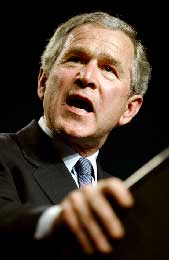 |
| President Bush with students of West View Elementary School in Knoxville, Tennessee. (AP) |
Washington, Jan. 9 (Reuters): Buoyed by a successful landing on Mars by a robot explorer, US President George W. Bush plans a major announcement on space policy next week that envisions sending Americans back to the moon and ultimately to Mars, officials and congressional aides said yesterday.
Nearly a year after the shuttle Columbia exploded on re-entering the atmosphere, sending Nasa into a deep spell of melancholy, Bush is expected to outline a sweeping vision of US space leadership.
He is expected to propose a new lunar initiative leading to a permanent American presence on the moon and a mission to Mars in the long term, said the sources, who asked to remain unidentified.
Speaking to reporters with Bush in Florida, White House press secretary Scott McClellan said that after the Columbia tragedy Bush made clear his desire for US space exploration to continue. “The President directed his administration to do a comprehensive review of our space policy, including our priorities and the future direction of the programme, and the President will have more to say on it next week,” McClellan said, declining to reveal any details in advance. Bush is scheduled to be in Mexico on Monday and Tuesday so any announcement is not expected before Wednesday.
Congressional sources said the administration was also considering setting up a more streamlined hierarchy for guiding the government’s wide-ranging space programmes and coordinating its research and development. Under this scenario, there could be more exchanges of technology between Nasa and the defence department.
Some members of Congress are worried about ensuring the US remains the global leader in space exploration. “If we don’t do it, somebody else will,” said Tennessee Representative Bart Gordon, a ranking Democrat on the House Science Committee. “The Chinese, the Europeans and the Japanese all have the goal of going to the moon. Certainly we don’t want to wake up and see that they have a base there before we do.”
The new space plan was spearheaded in large part by Nasa administrator Sean ’Keefe, who was appointed by Bush to restore credibility to an agency plagued by budget troubles, including billions of dollars in cost overruns at the international space station.
Vice-President Dick Cheney was also involved in the policy development, along with other senior Bush advisers. The administration was said to see the initiative as an important national security measure and experts said it could lead to new technologies and potential new sources of energy.
Bush’s father, former President George Bush, had proposed a mission to Mars that was scuttled because of concerns over its high cost. The younger Bush likewise faces budgetary constraints including a budget deficit expected to top $500 billion this year alone. Experts say a moon mission could be done without a significant increase in the budget by spreading the cost over seven to 10 years.
“You can use the existing infrastructure and be back on the moon in 5 to 10 years with a modest investment. You don’t have to double the Nasa budget,” said Paul Spudis, a planetary scientist at the Johns Hopkins University Applied Physics Laboratory in Baltimore, Maryland.
Bush’s election-year announcement is likely to face challenges from fiscal conservatives and Democrats who want him to focus on domestic issues like education and health care.
Experts said the goal should be to set up a research base on the moon to test technologies that would be useful on a mission to Mars.










